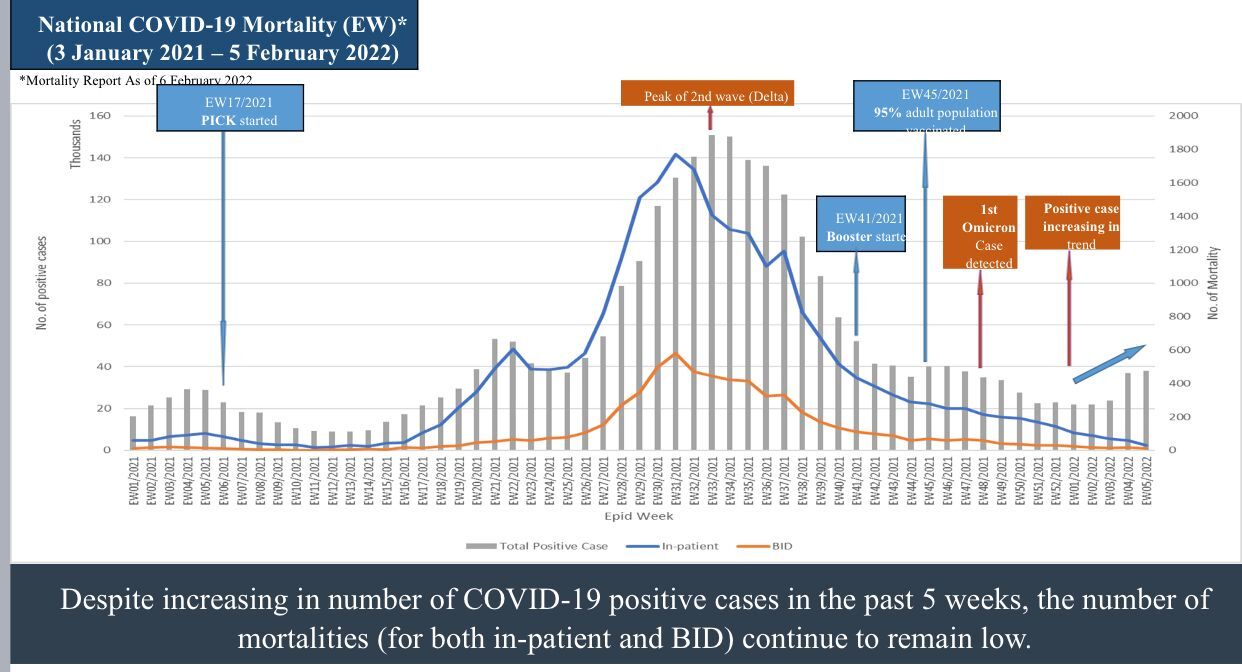KUALA LUMPUR, Feb 7 – The Ministry of Health’s (MOH) modelling estimates the Omicron wave to peak in the second half of March, a month before Hari Raya Aidilfitri in early May, Khairy Jamaluddin said today.
The health minister said this was in line with waves of the highly transmissible Covid-19 variant peaking in other countries in about two months.
“If we play our role, get our booster dose and children vaccinated, hopefully in one to two months, Omicron will decline, Selamat Hari Raya,” Khairy told a press conference today.
“To make sure we can blunt an exponential rise, work from home, get booster doses, test before you go for events and meeting people, especially if you’re symptomatic. Some of these things are common sense.”
He also confirmed that Omicron has replaced Delta as the dominant coronavirus variant in Malaysia.
The Delta variant comprised 93 per cent of 396 whole genome sequences that Malaysia shared with the global GISAID database from December 1 to 14 last year. However, of another 713 sequences registered in the second half of December, Omicron comprised 68 per cent, with Delta forming the remaining 32 per cent.
These samples were mostly taken from positive Covid-19 cases reported at the international gates of the country.
A recent sample of 62 sequenced community Covid-19 cases in the Klang Valley showed 55 per cent Delta and 45 per cent Omicron.
“So when we take both the figures from international entry gates and the recent community sample that we did, IMR (Institute for Medical Research) is of the view that Omicron is the dominant variant now,” Khairy said.
MOH today reported 11,034 new Covid-19 cases, the highest 24-hour increase in four months since October 1 with 11,889 infections.
Khairy pointed out, however, that Omicron appeared to be milder than the Delta variant. Malaysia reported 43,062 new Covid-19 cases in the fifth epidemiological week (January 30 to February 5), a 35 per cent increase from 31,980 cases reported the previous week.
However, moderate to severe infections rose only 17 per cent in the same period to 335 cases in Categories Three to Five last week.
Covid-19 intensive care unit (ICU) patients reduced 17 per cent to 91 cases last week from the previous week, while deaths fell 8.1 per cent to 68 in the fifth epidemiological week.
Khairy said there are currently 850 ICU beds in hospitals nationwide, with 14 per cent occupied in the January 30 to February 5 week, a decline of one percentage point from the previous week.
Health director-general Dr Noor Hisham Abdullah reported 58 new cases in Categories Three to Five today, following 77 yesterday.
When CodeBlue asked if the 850 ICU beds nationwide could be filled up in just nine days, assuming that 1 per cent of 10,000 new daily Covid-19 cases require intensive care, Khairy said MOH has beds that can be repurposed for ICU.
“We’re now taking stock of beds that can be repurposed, including oxygenated beds, so we will be ready for the surge. That also does not include decanting of patients to the private sector.”
One of the main factors behind the high number of Covid-19 deaths during the Covid-19 crisis that overwhelmed Klang Valley’s health care system in July to August last year was the lack of adequately staffed ICU beds.
As of yesterday, MOH has prepared for the Omicron surge with 120 Covid-19 hospitals comprising nine full Covid-19 hospitals and 111 hybrid facilities. There are 43 Low-Risk Covid-19 Quarantine and Treatment Centres (PKRC) with 10,810 beds.
“We expect that most Covid-19 cases will not be referred to the hospital, but will be referred to PKRC for low-risk management and short-term stay. Experience in other countries shows Omicron requires a shorter treatment period compared to Delta,” said Khairy.
MOH has also reactivated the National Covid-19 Rapid Response Task Force (RRTF) that is responsible for rapid management of the coronavirus epidemic in certain states or areas, similar to the Greater Klang Valley Special Task Force that managed to bring the region’s Covid-19 crisis mid-2021 under control.
“If the surge is too high, we will be able to manage hospital admissions, repurpose beds, add ICU capacity, and decant non-Covid cases to the private sector to make space for Covid cases.
“For now though, we’re of the view that the severity of the Omicron wave is not the same as Delta and perhaps does not require boosting capacity in hospitals,” Khairy said.








